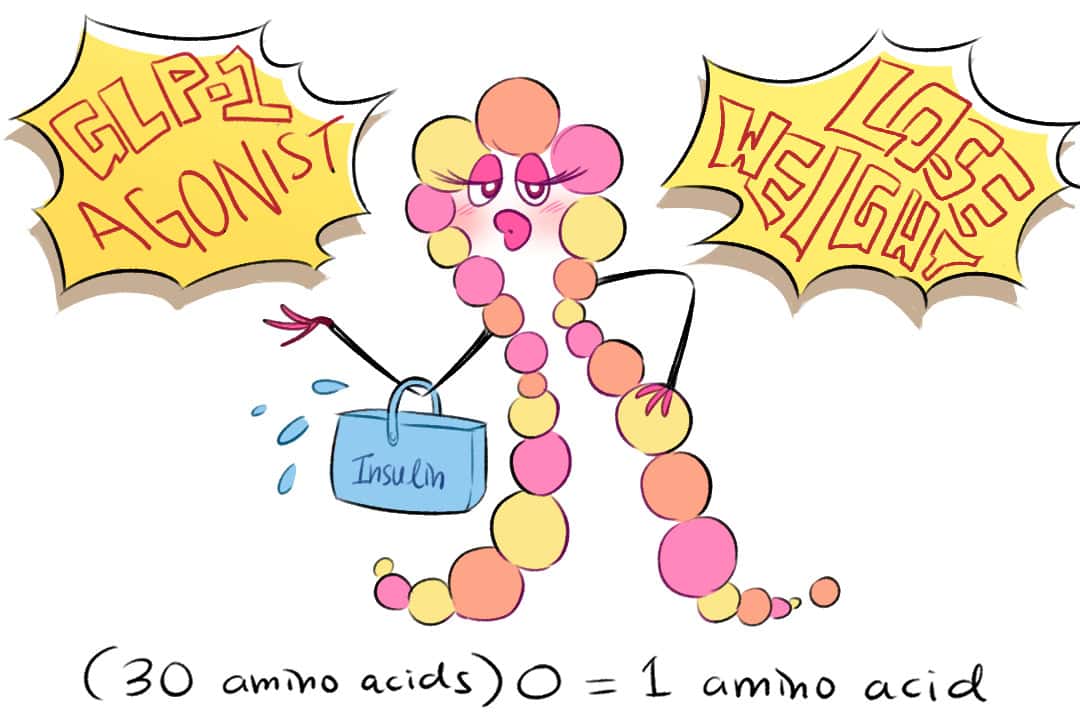In the past few years, medications like Ozempic and Wegovy have made headlines for their transformative but problematic impact on weight loss and diabetes management.
These medications — also called glucagon-like peptide-1 (GLP-1) receptor agonists as they mimic a naturally occurring hormone called GLP-1 — are not only changing how people manage their blood sugar but are also offering new hope to those struggling with weight loss. But how exactly do they work and what makes them so different from other weight loss treatments?
What are GLP-1 agonists?
Diabetes is a chronic condition that affects how our body processes sugar or glucose. Normally, glucose from our food enters the bloodstream and travels into cells to be used for energy. This process requires insulin — a hormone created in the pancreas — to ‘unlock’ the cells to let glucose in. When your body doesn’t produce enough insulin or doesn’t use the insulin properly, glucose remains in your bloodstream which causes high blood sugar levels. Over time, the high blood sugar starts damaging your eyes, kidneys, nerves, and blood vessels.
GLP-1 is a hormone your body naturally produces in the small intestine. It plays a role in how your body manages blood sugar by encouraging insulin release and slowing down digestion, keeping blood sugar levels stable.
GLP-1 agonists are a class of medications, where the term ‘agonist’ is defined as the medication’s ability to activate a certain response in the body — in this case, mimicking naturally-produced GLP-1 to help the body release more insulin. Prescription drugs like Ozempic — a brand of semaglutide, an injectable type of antidiabetic GLP-1 agonist — and Wegovy — a higher-dose version of semaglutide specifically for weight management — mimic GLP-1, leading to both improved blood sugar control and significant weight loss in many patients.
Jennie Ding is a family physician and founder of Kale Health Canada, an organization that specializes in education on lifestyle medicine, diabetes reversal, and blood sugar optimization. When asked how GLP-1 agonists differ from other diabetes medications such as insulin, Ding explained in an email to The Varsity that, “Insulin therapy involves injecting insulin to directly lower blood sugar levels. In contrast, GLP-1 agonists mimic the action of the natural hormone GLP-1, which stimulates insulin secretion only when blood sugar levels are high.”
Weight loss: More than just a side effect
Though these drugs were originally developed for managing blood sugar in people with type 2 diabetes, researchers soon realized that people taking these drugs were also losing a considerable amount of weight. Studies show that Ozempic and Wegovy users can achieve reductions of 10–15 per cent of their body weight.
GLP-1 agonists help weight loss because “they also act on appetite centers in the brain to reduce hunger and cravings,” wrote Ding. “Many of my patients have experienced weight loss while on GLP-1 agonists, which can be especially beneficial for those struggling with obesity alongside diabetes.” Obesity is a risk factor for diabetes, and 90 per cent of patients with diabetes are also overweight or obese.
Benefits beyond weight loss
Interestingly, the benefits of GLP-1 agonists extend far beyond weight loss and blood sugar management. When asked about other health benefits of GLP-1 agonists, Ding mentioned their potential impact on heart and gut health. “GLP-1 agonists have been shown to reduce the risk of major cardiovascular events, such as heart attacks and strokes in people with type 2 diabetes. They can help lower blood pressure and improve lipid profiles [in other words, the level of fats in the blood], by reducing LDL [Low-density lipoprotein] cholesterol and triglycerides,” she wrote.
This is a game-changer for many patients. But as Ding pointed out, “More research is needed to fully understand the potential benefits and risks in non-diabetic populations. It’s always important to consult a healthcare professional before considering GLP-1 agonists for uses beyond their approved indications.”
What does the future hold?
The growing popularity of Ozempic and Wegovy’s has also raised concerns among physicians. These medications can have side effects such as nausea, vomiting, diarrhea, and in some cases, more serious issues like gallbladder disorders.
Ozempic has been treated like a “quick fix” weight loss solution for celebrities like Amy Schumer and Elon Musk, but there are risks associated with taking the drug for reasons other than its intended purpose. As it lowers blood sugar, GLP-1 agonists can increase the risk of hypoglycemia in those not affected by diabetes. Hypoglycemia can manifest in headaches, dizziness, and heart palpitations. According to MedlinePlus, “Semaglutide injection may increase the risk that you will develop tumors of the thyroid gland.”
Additionally, not all users may experience the same level of weight loss and some might regain weight after stopping the medication.
“It’s important to understand that GLP-1 agonists are not miracle drugs,” Ding cautioned. “Some people may not experience significant weight loss, especially if they don’t also improve their nutrition and lifestyle habits.”
As the science of weight loss evolves, it’s clear that GLP-1 agonists are reshaping our understanding of obesity and diabetes. While diet and exercise remain essential parts of any weight loss journey, medications like Ozempic and Wegovy offer a new level of support, especially for those who have struggled with traditional methods of weight loss or for those who require immediate weight loss results.



No comments to display.